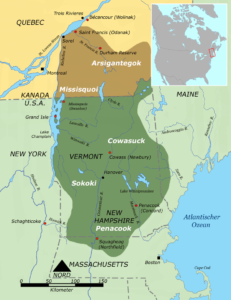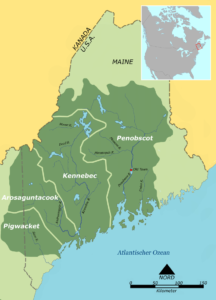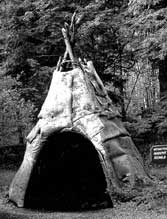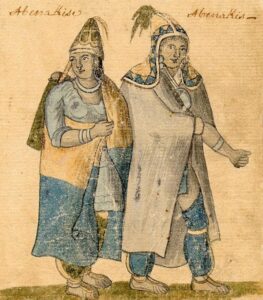
 The Abenaki people were a tribe of Indians with a number of names…or at least meanings for their names. They were also known as the Abnaki, which was pronounced OBB-uh-nah-kee. This people spoke Algonquian, and called themselves Alnôbak, which meant “Real People.” That was probably the closest to describing the actual essence of the people. Another version of their name was Abenaki, which means “people of the dawn.” The Abenaki were a linguistic and geographic grouping, rather than a single tribe, which would explain the various meanings of their tribal name. The Abenaki people were made up of numerous smaller bands and tribes who shared many cultural traits. The Abenaki people called their homeland Ndakinna, which meant “our land” and extended across most of northern New England, southern Quebec, and the southern Canadian Maritimes.
The Abenaki people were a tribe of Indians with a number of names…or at least meanings for their names. They were also known as the Abnaki, which was pronounced OBB-uh-nah-kee. This people spoke Algonquian, and called themselves Alnôbak, which meant “Real People.” That was probably the closest to describing the actual essence of the people. Another version of their name was Abenaki, which means “people of the dawn.” The Abenaki were a linguistic and geographic grouping, rather than a single tribe, which would explain the various meanings of their tribal name. The Abenaki people were made up of numerous smaller bands and tribes who shared many cultural traits. The Abenaki people called their homeland Ndakinna, which meant “our land” and extended across most of northern New England, southern Quebec, and the southern Canadian Maritimes.
While the Abenaki people included a number of tribes, they were classified into two geographic groups, the Western Abenaki and the Eastern Abenaki. The Eastern Abenaki population was concentrated in portions of New Brunswick, Canada, and in Maine, east of New Hampshire’s White Mountains. Some of these tribes included the Kennebec, Maliseet, Penobscot, Ossipee, Mi’kmaq, and the Passamaquoddy. The Western Abenaki lived in the Connecticut River Valley in Vermont, New Hampshire, and Massachusetts. Some of those tribes included the Pennacook, Pequawket, Sokoki, and Winnipesaukee.
Before the entrance of the Europeans, the Abenaki (excluding the Pennacook and Mi’kmaq) were estimated to have numbered approximately 40,000 people. Unfortunately, when they came in contact with the Europeans they were exposed to numerous diseases and ailments such as typhus, influenza, smallpox, diphtheria, and measles, and with no prior immunity to these things, these outbreaks often resulted in a 75% mortality among the tribes.
Those things didn’t slow down the immigration, and as the settlers continued to populate New England, many 
 of the Abenaki retreated north into Quebec, Canada. The ones who stayed decided to join with the Wabanaki Confederacy to fight the European encroachment upon their lands. This brought them into a total of six Indian Wars, including King Philip’s War from 1675 to 1678, King William’s War from 1688 to 1697, Queen Anne’s War from 1702 to 1713, Lovewell’s War from 1722 to 1725, King George’s War from 1744 to 1748, and the French and Indian War from 1754 to 1763. These long years of war and disease, took a heavy toll of the Abenaki people, leaving less than 1,000 Abenaki remaining after the American Revolution. The descendants of those 1,000 Abenaki people live on two reservations in Quebec and are scattered around New England.
of the Abenaki retreated north into Quebec, Canada. The ones who stayed decided to join with the Wabanaki Confederacy to fight the European encroachment upon their lands. This brought them into a total of six Indian Wars, including King Philip’s War from 1675 to 1678, King William’s War from 1688 to 1697, Queen Anne’s War from 1702 to 1713, Lovewell’s War from 1722 to 1725, King George’s War from 1744 to 1748, and the French and Indian War from 1754 to 1763. These long years of war and disease, took a heavy toll of the Abenaki people, leaving less than 1,000 Abenaki remaining after the American Revolution. The descendants of those 1,000 Abenaki people live on two reservations in Quebec and are scattered around New England.


Leave a Reply